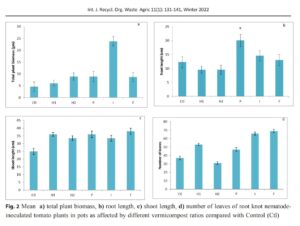Purpose: Waste and waste disposal is a universal problem and attention is required in all ways. The plant generated waste (leaf litter) is also a type of organic waste that creates multiple issues in urban areas. Method: Vermicomposting is a suitable alternative safe, hygienic, and cost-effective disposal of organic solid waste with the help of […]
Purpose In Bangladesh, the sludge of textile effluent treatment plant has been considered as a potential environmental threat due to its huge volume and chemical content. Thus, the present study was carried out to assess the reuse possibility/potentiality of textile sludge in agricultural applications. Method Textile sludge was applied at different loading ratios (0–100 % […]
Purpose To study the organic production in two varieties of Linum (Linseed) crop using different proportions of vermicomposts and combination of vermiwash as an environment friendly substitute to chemical fertilizers for organic farming of Linseed. Method Vermicompost prepared from cattle dung was mixed in different proportions, i.e. 0, 20, 40, 60, 80, and 100% vermicompost […]
Purpose Upsurge of oil-mill industries and associated generation of wastewaters constitutes a huge environmental problem in Nigeria. As an option to reckless disposal, such effluents are often fermented and used as biofertilizers for nutrient-poor soils, but the potential of cottonseed oilmill effluent (COME) and agronomic evaluation of such potential has yet been studied. Methods A […]
Purpose Use of silicate rock powders as fertilizer improves nutrient cycling, thus benefitting agriculture. The availability of nutrients to plants is often low, but can be increased when rock powder is vermicomposted and added. However, these powders can be rich in heavy metals, which may impair their use. We evaluated maize growth and heavy metals […]
Purpose Due to increasing water demand in worldwide, treated wastewater (TWW) will become an important component in agriculture, particularly in countries facing the water scarcity. Using judiciously the already existing water resources in agriculture production can be proved by using efficient irrigation method. MethodsThis study investigates the impact of two irrigation water quality including; treated […]
Purpose In recent years, attempts have been made to compensate irrigation water shortage through widespread wastewater application as a low-quality water resource for agriculture. The existing wastewater treatment plants do not have sufficient capacity to treat such a huge volume of wastewater. In arid and semiarid region, soil type as well as climate is different […]
Purpose Reuse of landfill leachate is an effective alternative for their nutrients to mitigate decrease in freshwater. On the other hand, the growth of vegetation in the final disposal areas provides many benefits such as improving the visual impact, controlling of hydric erosion, etc. The purpose of this work was to evaluate landfill leachate as […]
Purpose Organic solid wastes contain tremendous amounts of nutrients and beneficial microbes that cause environmental problems, such as pollution and shortage of dumping sites. Vermicomposting, considered as one of the most suitable stabilization and mass reduction methods, has been recognized for biowastes. This study aimed to evaluate the microbial diversity and analyze the ability of […]

Purpose Utilization of food waste as composting materials offers a sustainable solution to manage waste and reduce reliance on fertilizers. Method This study is focused on the efficiency of food waste compost and the effect of the addition of magnetite (Fe3O4) nanoparticles on the growth and heavy metals uptake by roselle (Hibiscus sabdarifa) for the […]